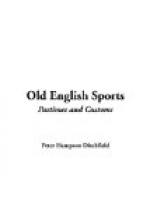On this night the fishermen of Scotland signed their boats, that is put a cross of tar upon them, in order that their fishing might prosper. The church bells were rung all night long for all Christian souls, and we find from some old account books that the good folk were very careful to have all their bell-ropes and bells in good order for All-hallow Even. This ringing was supposed to benefit the souls of the dead in Purgatory, and was suppressed after the Reformation.
There were some very homely pastimes for All-hallow Even for the young folk in the north of England. Apples were placed in a vessel of water and “dived for”; or they were suspended from the roof and caught at by several expectant mouths. Sometimes a rod was suspended with an apple at one end, and at the other a lighted candle. The youths had their hands tied behind their backs, and caught at the apple, often causing the candle to swing round and burn their hair. The cracking of nuts was an important ceremony among the young men and maidens, who threw nuts into the fire, and from the way in which they cracked, or burned, foretold all kinds of happiness or misery for themselves. The nuts that burned brightly prophesied prosperity to their owners, but those that crackled or burned black denoted misfortune. In olden times, when people were more superstitious than they are now, they attached great importance to these omens and customs, but happily the young people of our times have ceased to believe in magic and foolish customs, and country girls strive to attract their swains by other charms than those of nut-cracking on All-hallow Even.
We have still our bonfires on November 5th, but the event which happened on that day is very recent as compared with many of the old customs of which I have been writing. However, it is nearly three hundred years ago since Guy Fawkes and his companions attempted to blow up the Houses of Parliament with gunpowder; and yet we still light our bonfires and burn Guy Fawkes’ effigy, with much accompaniment of squibs and crackers, just as if the event which we commemorate only occurred last year. Probably very few of our rustics think much of the origin of the customs observed on November the Fifth, or remember that it was instituted by the House of Commons as “a holiday for ever in thankfulness to God for our deliverance, and detestation of the Papists;” but this ignorance does not prevent them from keeping up the custom and enjoying the excitement of the bonfire and fireworks. If you are not acquainted with the history of the conspiracy, I would advise you to read it in some good history book, and—
“Pray to remember
The fifth of November
Gunpowder
treason and plot,
When the King and his
train
Had nearly been slain,
Therefore
it shall not be forgot.”
The Berkshire boys, as they carried their Guy and collected wood for their bonfires, used to add the words—




